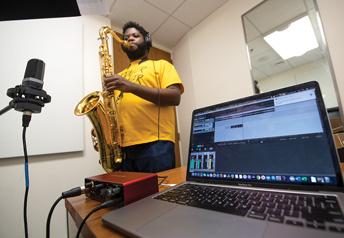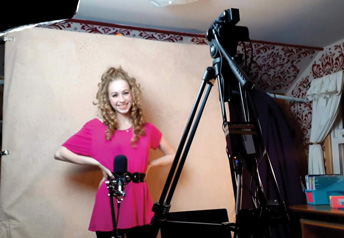
Contact Us
Institutional Communications
Bureau of Mines Building, Room 137
Laramie, WY 82071
Phone: (307) 766-2929
Email: cbaldwin@uwyo.edu
Live Performances Live On
January 7, 2021

Music Performance major Dionte George mixes, records and edits his saxophone performance
in one of the Buchanan Center’s many practice rooms.
Performing arts go virtual and get creative amid pandemic.
By Micaela Myers
When the COVID-19 pandemic hit the country last spring, sending University of Wyoming classes online, the departments of Music and Theatre and Dance used creativity and technical know-how to keep the live performances coming.
Music
The music department pursued innovative recording projects over the spring and fall semesters.
“Students learned how to record, edit and distribute their music through multiple media outlets,” says Department Head and Professor Scott Turpen.
Ensembles recorded parts individually that were then edited together.
“It’s something we haven’t traditionally done in our curriculum, and we’re really excited about how students will be able to participate in these recordings,” he said in early fall. “We’ve purchased microphones and audio interface systems so students can go into a practice room or be at home to make their own recordings in their own spaces. They’ll learn how to set up these recording devices, set their own levels, do their own editing and combine video and audio files.”
The technical skills students learn will benefit their careers as musicians and teachers.
The virtually distributed music also can reach a broader audience.
“I’m learning crucial mixing and editing skills that would be handy for any musician to know—basic mic setup and placement to achieve the best possible sound and quick and useful editing tools that could really go hand in hand with editing videos for, let’s say, a marketing gig,” says Larry Shaw, a master’s student in music performance from Gillette, Wyo.
“Now I have professionally produced recordings and videos to share with family friends and potential venues when they open back up,” he says. “Playing, recording and then listening back really opens your eyes to what worked well in a musical context but what also didn’t work. It really forces you to become better.”
The new 12-credit certificate in audio technology was a timely rollout this fall.
“We’re working to modernize our curriculum for the 21st century,” Turpen says. “Students will learn how to record and manipulate recorded sounds as well as provide sound reinforcement for live concerts or events.”
Recent master’s graduate and longtime audio technician Will Flagg is heading up the certificate program.
“I am very excited to be able to offer music students workplace skills they can take with them,” he says.
These skills apply not only to typical musician careers, but also pursuits such as corporate audio-visual. All slots for the new certificate were filled this fall, showing that there is a great deal of interest in the new program.

Asking Strangers the Meaning of Life tech setup with Hazel Homer-Wambeam. (Courtesy
photo)
Theatre and Dance
Before the pandemic, two plays were scheduled for the summer. When COVID-19 hit, the department acquired digital rights to one of them, God of Carnage, and went about determining the best way to take the play virtual and live in June.
“We decided to embrace the challenge of producing the show digitally and streamed live performances for five nights,” says Professor Margaret Wilson. “Using cameras in the actors’ homes in remote locations and two different states, we edited and combined the video with mixing software in the Buchanan Center, effectively bringing the four actors onto one screen.”
They had seen Zoom performances but wanted to up the quality of their production.
“We were looking at two options: Do we film and edit it and do a recorded version, or do we do a live stream?” says artistic director and Assistant Professor Scott Tedmon-Jones. “We ended up trying to keep it live as much as possible. We delivered everything to the actors and set it up virtually.”
Student Ben Boyd was hired as a virtual programmer, operator and stage manager.
“Ben and I explored how we could combine individual cameras to create a sense of a live space,” says Assistant Lecturer Jason Banks. “With a little research, we found a way to connect our cameras directly with the production software.”
While going virtual came with many challenges, it allowed audience members to tune in from all over the world.
“The play is written so that there are two couples in the same room,” Banks says. “We wanted to give the impression of a unified room that they’re all sitting in as if they’re at the same table. There were visual tricks that really helped reinforce that unified space.”
For example, actors appeared to pass items to one another.
The play was well received and a great learning experience for all involved. Students gained technical skills to use in their future careers.
Summer also brought the 25th annual Snowy Range Summer Dance Festival, which usually welcomes hundreds of young dancers to campus. This year, with funding the Wyoming Arts Council and the Colonel Rogers University of Wyoming Excellence Fund, the festival was free and online, with four days of virtual classes with esteemed national professionals.
“We were able to bring in students from Wyoming, Colorado, Nebraska, Idaho and Florida,” Wilson says. “We had really fabulous faculty who have adapted to teaching over Zoom.”
As fall semester kicked off, the play Asking Strangers the Meaning of Life took on a similar virtual approach to God of Carnage.
“Compositionally, it’s different; performatively it’s completely different; but the technology approach is very much informed from our experiences over the summer,” Banks says.
Like the summer production, the play was streamed over Vimeo free to students and $5 for others.
The second fall production, a musical with dancers and singers—29—was made into a film released in early January, with documentaries about its making distributed throughout the fall.
“For the spring semester, we have three performances scheduled,” Wilson says. “The first one is a play that has been adapted to online delivery called She Kills Monsters: Virtual Realms. Our goal is to produce A Midsummer Night’s Dream ballet on stage. Shakespeare’s As You Like It will round out the season. Our commitment is to provide students the opportunity to practice their craft and have outreach to the community, the state and beyond.”
Contact Us
Institutional Communications
Bureau of Mines Building, Room 137
Laramie, WY 82071
Phone: (307) 766-2929
Email: cbaldwin@uwyo.edu


